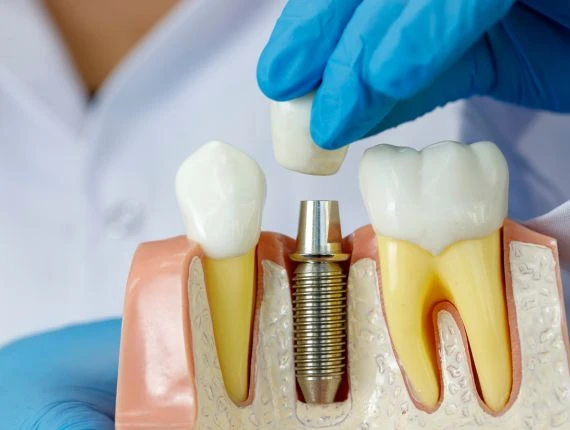How to Care for Your Dental Implants

How to Care for Your Dental Implants
Dental implants are a long-lasting solution for tooth replacement, providing patients with the appearance and function of natural teeth. However, just like natural teeth, dental implants require regular care and maintenance to ensure their durability and to prevent complications, such as infection or implant failure.
Regular dental check-ups and professional cleanings
Maintaining regular dental check-ups and professional cleanings is the first step in caring for your dental implants. Your dentist will monitor the health of your implant, surrounding gum tissue, and bone levels. Professional cleanings will help remove any plaque and tartar buildup that may have accumulated around your implant, which can lead to gum disease or implant failure if left untreated.
Daily oral hygiene routine
Just like with natural teeth, dental implants require a diligent daily oral hygiene routine. This includes brushing at least twice a day, flossing, and using mouthwash. When brushing, be sure to use a soft-bristled toothbrush and non-abrasive toothpaste, as abrasive products can damage the implant's surface. Angle the brush at a 45-degree angle, ensuring that you clean all surfaces of the implant, including the area where it meets the gum line.
Flossing is crucial for maintaining the health of the gum tissue surrounding your implant. Use specialized floss or interdental brushes designed for dental implants, which can clean the hard-to-reach areas around the implant more effectively. Gently slide the floss or brush between the implant and the adjacent tooth, cleaning both sides thoroughly.
Adding an antimicrobial mouthwash to your daily routine can help reduce bacteria in your mouth and protect your implant from infection. Ensure that the mouthwash is alcohol-free, as alcohol can dry out your mouth and lead to increased plaque buildup.
Proper cleaning techniques for dental implants
While brushing and flossing are essential for maintaining the cleanliness of your dental implant, there are specific cleaning techniques that can make the process more effective:
- Use a circular motion when brushing your implant, as this helps to clean all surfaces and minimize the risk of scratching the implant.
- Consider using an electric toothbrush, which can more effectively remove plaque from dental implants.
- When flossing, gently back and forth, wrapping the floss around the implant in a "C" shape to clean all sides.
- Don't forget to clean the backside of your implant, as plaque can accumulate here, leading to gum disease or implant failure.
Avoid harmful habits
Certain habits can harm your dental implant and should be avoided to ensure its longevity. These include:
- Smoking: Smoking can slow down the healing process after implant surgery and increase the risk of implant failure. It can also contribute to gum disease, which can compromise the health of your implant.
- Chewing on hard objects: Avoid chewing on hard items, such as ice, pens, or hard candy. These can damage the implant's surface or cause it to become loose.
- Grinding or clenching your teeth: If you suffer from bruxism (teeth grinding or clenching), speak with your dentist about treatment options, as this habit can damage your implant and the surrounding bone.
Caring for your dental implants is crucial for maintaining their appearance and function. By following the proper cleaning techniques and maintaining a diligent oral hygiene routine, you can ensure the longevity of your implants and keep them looking and feeling their best. Remember to see your dentist in Wasilla AK regularly for check-ups and professional cleanings, and avoid harmful habits that can compromise the health of your dental implants.
Leave a Reply
Your email address will not be published. Required fields are marked *




One Comment
Make sure to replace your toothbrush every three months or when it begins to show wear, whichever comes first.
Reply